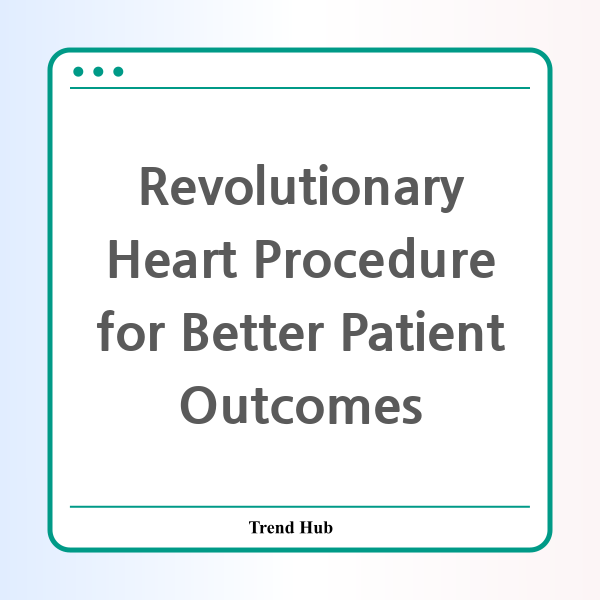* This website participates in the Amazon Affiliate Program and earns from qualifying purchases.

Are you aware that heart disease is the leading cause of death in the United States? This shocking statistic highlights the importance of prioritizing heart health, especially during February, which is recognized as American Heart Month. With new developments in cardiac treatment, patients now have access to faster recovery options and improved outcomes thanks to innovative procedures like Pulse Field Ablation.
Every year, over 350,000 individuals in the U.S. experience cardiac arrest, with only about 10% surviving. This troubling reality emphasizes the need for early detection and preventive measures in managing heart health. Dr. Marcos Daccarett, an electrophysiologist, stresses the importance of being proactive: "It’s a very important time for us. Specifically, a majority of the treatments and options that we have for our patients require self-awareness and requires preventive diagnosis."
Common symptoms of heart-related issues include chest pains, weight or pressure in the chest, fatigue, and shortness of breath. Recognizing these signs is crucial for seeking timely medical attention. Standard treatments for conditions like atrial fibrillation involve medications and procedures such as blood thinners and ablations. However, when these treatments fall short, newer options like Pulse Field Ablation come into play.
Pulse Field Ablation is a cutting-edge inpatient procedure that employs short bursts of high energy or radio frequencies to alter the heart tissue responsible for atrial fibrillation. According to Dr. Daccarett, this method not only yields better results but also allows patients to experience quicker recoveries and reduced dependence on medications that often carry significant side effects. Patients who undergo this procedure report improvements in their condition, enabling many to stop anticoagulation therapies.
To bolster heart health, both Intermountain Health and St. Luke’s Heart Rhythm Center advocate for comprehensive lifestyle changes. Important steps individuals can take include:
- Maintaining a Balanced Diet: Focus on whole grains, fruits, and vegetables while minimizing processed foods, fats, and sugars.
- Regular Exercise: Engaging in physical activity helps keep the heart toned, lowers blood pressure, and reduces cholesterol.
- Avoiding Smoking and Vaping: Tobacco use remains a significant risk factor for heart disease, and both healthcare providers and experts urge cessation.
- Managing Stress: Attention to mental well-being is also essential; consider discussing stress management techniques with your healthcare provider.
- Monitoring Pre-Existing Conditions: Keeping high blood pressure, high cholesterol, and diabetes in check is crucial for heart health.
February is a great time to assess your heart health and take proactive steps toward prevention. Both St. Luke’s and Intermountain Health are providing valuable resources and quizzes to help evaluate your risk and encourage heart-healthy habits. Early detection and education can make a significant difference in managing heart disease.
In conclusion, as we recognize National Heart Month, let’s take the opportunity to prioritize our heart health by embracing preventive measures, understanding treatment options, and making informed lifestyle choices. Remember, a healthy heart contributes to a longer, happier life.
* This website participates in the Amazon Affiliate Program and earns from qualifying purchases.